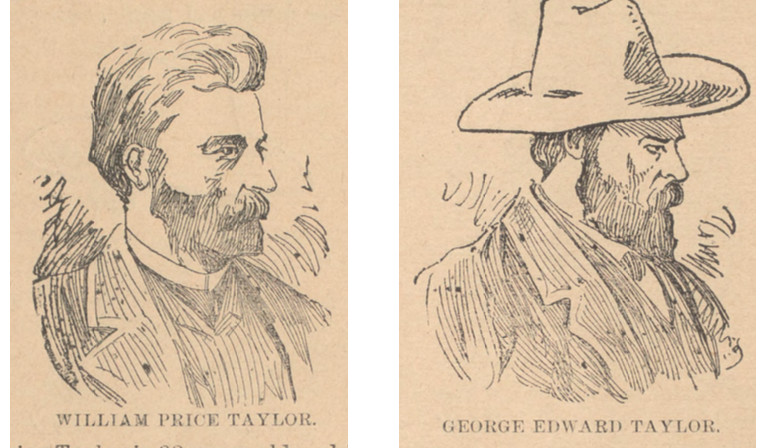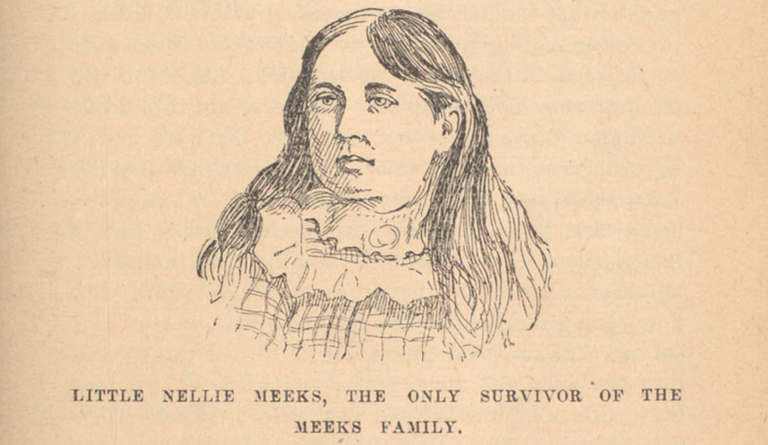The American South has a tradition of murder ballads: narrative songs that recount the events of killings. We’re going to have a look at one mostly-nonfictional ballad in particular, The Meeks Murder, and how you can use it to build an adventure with the song itself as your opponent!

The story begins in 1894 in Missouri. The villains of this piece are brothers Bill and George Taylor, from a wealthy and influential family. Bill was a lawyer and former state legislator. George was a farmer (and famously handsome). Despite their standing and money, they were low criminals! They’d taken to rustling cattle with a dim-witted fellow named Gus Meeks.
The three men were caught, but the Taylor brothers used their pull to escape prosecution. Gus Meeks was convicted and sent to prison. But the governor of Missouri saw an opportunity to lock up Bill and George. He pardoned Gus in exchange for a promise to testify against the Taylors. Bill and George, meanwhile, offered Gus $800, a wagon, and the team to pull it if Gus, his wife, and three daughters would leave the state. Gus accepted.
On the appointed day, the Taylor brothers arrived at the Meeks farm with the wagon and team. The Meeks loaded up their possessions, climbed into the wagon, and rolled on down the road with the Taylors. But before the wagon could leave the property, the Taylors turned on the Meeks! The brothers massacred the entire Meeks family, except for five-year-old Nellie Meeks, whose head they’d cut to the bone, and whom they’d assumed was dead.
The Taylors dug a hole under a haystack on the Meeks’ farm, dumped the bodies in it, and lit the haystack on fire to destroy the evidence. Rain put out the fire after the Taylors fled. Little Nellie escaped, and the truth came out.
Both of the brothers were convicted. They soon escaped, but only Bill was caught. Bill Taylor was hanged in 1896. His handsome brother George was never found. There are several ballads about the Meeks murder, but I haven’t been able to find any recordings. I do like the lyrics at this link.

At your table, you might have your PCs hear the song sung in a bar or dance hall. You can give the players a quick summary of the song, or you can play the above tune for them in the background while they go about their business. A little later in the session, have the PCs stumble upon a crime in progress: two brothers massacring a family, and leaving a little girl for dead. The murderers try to flee – the party had better catch them!
When captured, the murderous brothers tell of being possessed. They say some outside force took hold of their limbs, made them commit this heinous crime, and kept them from calling out. Observant PCs might remember these brothers were at the dance hall earlier in the evening. They may also notice the crime bears a startling resemblance to the one in the song.
If the PCs talk to the singer about the murder, he’ll admit to having frightfully bad luck. Over the past few months, there have been multiple murders like this one in the towns in which he’s stopped and sung. If the PCs help him connect the dots, he’ll realize the murders only occurred in towns in which he sang The Meeks Murder. There’s something bad about that song!
If the PCs follow up on the possession angle, let them find an NPC who can speak with the dead. In 1894, a Spiritualist would be a good choice. In a D&D-style setting, that could be a necromancer or a diviner. Through this NPC, the PCs learn that the possessing force is the angry ghost of the late Bill Taylor. Someone (the escaped George Taylor) hired another Spiritualist to bind Bill’s soul to this song. Singing the song summons Bill, who goes looking for a pair of brothers to compel to recreate his ghastly crime.
How tough it is to un-bind the ghost of Bill Taylor from the song is up to you. I would say that whatever one hired Spiritualist can do, another can undo. But maybe you want to make things harder. Maybe there is no way to un-bind Bill. Instead, the PCs have to convince the singer to stop singing The Meeks Murder.
There’s also the question of justice for the dead family and the two formerly-possessed brothers. Should the ‘murderers’ walk free? Can the PCs convince the local sheriff of it? If not, will the party bust the brothers out of jail, or let them swing for a crime they committed against their will?
If your players are interested, this standalone adventure has an obvious follow-on: tracking down the escaped George Meeks. He’s a murderer many times over (first the Meeks family, then every family cut down by Bill’s ghost). Who knows what he might do next!
–
Source: CrimeSong: True Crime Stories from Southern Murder Ballads by Richard H. Underwood






